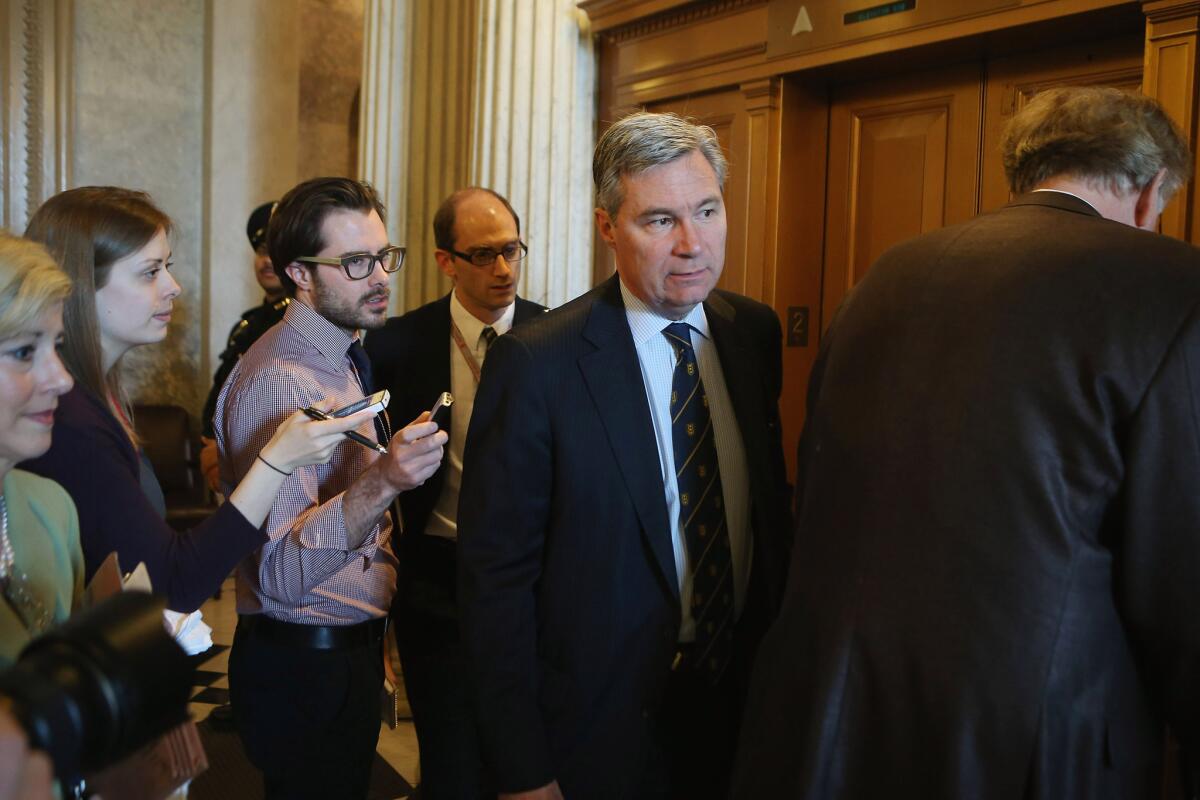Carbon tax? No thanks, says Senate

In case there was any doubt about the odds of Congress enacting a carbon tax, a Senate vote Saturday morning showed that they are long indeed.
Sen. Sheldon Whitehouse, a liberal Rhode Island Democrat, offered an amendment to the proposed fiscal 2014 budget resolution calling for “establishment of a fee on carbon pollution.” The amendment didn’t suggest who’d pay the fee or how large it would be; it required only that the fee not increase the deficit and that all the revenue raised be “returned to the American people in the form of federal deficit reduction, reduced federal tax rates, cost savings or other direct benefits.”
That’s such a wide set of options, it left room for the Senate to consider all of the carbon-tax proposals that have been floated. Some would use the revenue to narrow the federal budget gap; others would lower corporate and personal tax rates. Still others, such as the one favored by the Citizens Climate Lobby, would divvy up the money among consumers and businesses in the form of rebates, effectively shifting dollars from the most intensive carbon emitters to the least.
The big tent notwithstanding, the Senate rejected the amendment handily, 58 to 41. All 45 of the chamber’s Republicans voted against it, as did 13 Democrats from energy-producing or swing states.
Citing new Pope Francis’ comments about the need to be better “protectors of creation,” Whitehouse said it was arrogance to believe humanity could repeal the laws of nature, physics and chemistry. “We can ignore obvious facts, we can ignore the essentially unanimous science, we can ignore our generals and admirals, we can ignore the insurance industry’s warnings, but we ignore carbon pollution at our peril, and we have subsidized it long enough,” he told his colleagues.
Sen. Roy Blunt (R-Mo.) responded by focusing on how a carbon tax would affect low-income Americans. “I would just say, when the poor family cannot pay their utility bill -- the family who is the last family to get the new refrigerator, the family who is the last family to get the insulated windows, the family who is the last family to insulate their ceiling -- I guess we tell them there are going to be some federal tax rates that will be added for a family who cannot pay their utility bill.”
Amendments on a budget resolution are largely symbolic, given that such resolutions don’t have the force of law. And because Whitehouse’s proposal wouldn’t have required Congress to follow through with an actual tax on carbon emissions, it was more like a straw poll than a statement of intent.
Nevertheless, the vote illustrated how tough it would be to get a real “fee on carbon pollution” through the Senate, let alone the tax-allergic House. With at least eight Democrats representing states that are big producers of coal, oil or gas, any carbon-tax proposal will need at least five Republican votes to pass. Although there are a few GOP members of the Senate who’ve indicated a willingness to support higher tax revenue as part of a deal to solve Washington’s long-term budget problems, they want that revenue to be raised through a pro-growth overhaul of the tax code that winnows tax breaks and reduces rates.
The most viable option may be a fee that doesn’t generate any revenue at all for the federal government, but rather returns the money collected right back to the public in the form of rebates. But as Blunt’s argument notes, the fee wouldn’t be politically viable unless it was designed to hold low-income families harmless. That could be a tricky exercise, considering that those in rural or intemperate climates often have considerably higher bills for gasoline, fuel oil and power than the average American.
Supporters of a carbon tax can take all these signs with a grain of salt. The debate over each of the many budget amendments was cursory at best, and serious proposals such as Whitehouse’s were intermingled with frivolous and politically motivated ones, such as one by Sen. David Vitter (R-La.) to bar poor people from receiving subsidies for phone service if they choose a mobile phone instead of a land line.* Besides, a carbon tax in isolation isn’t going to be as appealing as one that’s part of a larger deal to address climate change and/or the government’s fiscal problems.
Yet Whitehouse himself declared that his amendment was a “test” of the Senate’s willingness to impose some form of carbon tax. And on that score, the vote is a clear signal that supporters of a tax have a lot of work to do on their sales pitch.
*That particular program has been abused in the past by some phone companies, which made the subsidies (which are funded by fees on other phone users) available to people who weren’t eligible for them. But if the government considers phone service vital enough to merit subsidies for low-income families, it shouldn’t matter to lawmakers what flavor of service someone chooses, as long as the amount of the subsidy doesn’t change.
ALSO:
HBO gives pay-TV cord-cutters a glimmer of hope
McManus: ‘Sequester’ causing pain -- to Congress
Termed-out Fuentes stays on Assembly payroll while running for council
Follow Jon Healey on Twitter @jcahealey
More to Read
A cure for the common opinion
Get thought-provoking perspectives with our weekly newsletter.
You may occasionally receive promotional content from the Los Angeles Times.











